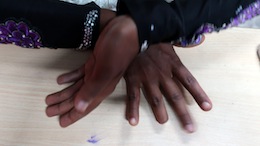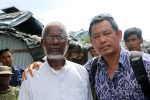Maung Zarni, right, with a 67-year-old Rohingya man from Maungdaw, who had been a leader at a township level in former prime minister Ne Win’s early days, when Rohingyas were recognized as an ethnic community with full citizenship rights. (photo from Maung Zarni)
Calls are mounting to recognize Myanmar’s violent campaign against the Rohingya as genocide. At the United Nations’ Human Rights Council in Geneva on March 12, Yanghee Lee, special rapporteur on the human rights situation in Myanmar, said she is “becoming more and more convinced that the crimes committed … bear the hallmarks of genocide and call[s] in the strongest terms for accountability.”
Nearly 800,000 Rohingya have fled state-sanctioned and -organized violence in Myanmar (Burma) since August 2017, after the government – blaming an alleged attack on Myanmar’s security forces by Rohingya militants – initiated a brutal campaign of arson, murder and systematic rape and torture against the civilian Rohingya population in Rakhine state. The violence follows decades of oppressive measures against the Rohingya, which, in recent years, have included restrictions on education and medical care, deliberate starvation, state-imposed birth control, property seizure, and removal of citizenship and civil rights.
“These human rights violations constitute nothing less than a slow-burning genocide,” human rights activist Maung Zarni, founder of the Free Burma Coalition, told the Jewish Independent.
With respect to the situation in Myanmar, for months terms like “atrocities,” “military crackdown” or “state-sanctioned violence” have been used to describe it, instead of using the word “genocide.” The UN has previously called what is happening in Myanmar, a majority Buddhist country, whose dominant ethnic group is Bamar, “ethnic cleansing.”
There have been some exceptions to the hesitancy to call the government’s actions genocide. For example, French President Emmanuel Macron called it that last September. And independent tribunals and experts like the International State Crime Initiative and the Permanent Peoples’ Tribunal have also called it genocide. But the media and other international organizations have generally not been using the word.

“There is a high barrier for the use of the term genocide, and I think this is correct,” said Rainer Schulze, professor of modern European history at the University of Essex and founder of The Holocaust in History and Memory journal, speaking at the Berlin Conference on Myanmar Genocide Feb. 26, which the Jewish Independent attended. “We should not use the term genocide lightly. Not every human rights violation, ethnic cleansing or forced resettlement is a genocide. The Genocide Convention gives us a very clear definition, but, with regards to the Rohingya, it is appropriate and must be used.”
Gianni Tognoni, general secretary of the Permanent Peoples’ Tribunal in Rome, agreed. “The UN has been playing with names,” he said at the conference. “To declare something as genocide is to declare it as something intolerable for the international community. Instead, this is delayed.”
“Governments, in general, are very reluctant to use the term genocide for fear that it could damage diplomatic initiatives to secure peace or damage bilateral relationships,” Kyle Matthews, executive director of the Montreal Institute for Genocide and Human Rights Studies at Concordia University, said in conversation with the Independent. “In some cases, governments have refused to label atrocity crimes as a genocide for fear it would force them to take a stronger response, such as intervening militarily.”
The Convention on the Prevention and Punishment of the Crime of Genocide adopted by the UN in 1948 obliges signatories to take concrete steps to respond to genocide. As of December 2017, 149 states had ratified or acceded to the treaty, including Canada. In 2005, all member states of the UN endorsed the Responsibility to Protect (R2P) doctrine, a doctrine Canada was instrumental in promoting. The Canadian government continues to avoid the term genocide, however – although it has taken some steps towards addressing the situation.
“I would say the Canadian government has been one of the most responsible and thoughtful governments in trying to find a solution to protect the Rohingya minority in Myanmar and in neighbouring countries,” said Matthews. “Ottawa has appointed Bob Rae as special envoy to the prime minister to help identify different policy options and strategies for engaging the government of Myanmar. Ottawa also recently imposed economic sanctions on leading figures in Myanmar’s military.”
On Feb. 16, the federal government imposed sanctions, under Canada’s new foreign human rights legislation, against Maung Maung Soe, a high-ranking member of the Myanmar military. “What has been done to the Rohingya is ethnic cleansing,” Foreign Affairs Minister Chrystia Freeland told CBC in a statement that did not use the word genocide. “This is a crime against humanity.”
The sanctions impose a “dealings prohibition,” which freezes an individual’s assets in Canada and renders them inadmissible to enter Canada under the Immigration and Refugee Protection Act.
Matthews said there is much more that we could be doing. Speaking at the Berlin conference, he said, “Broader economic sanctions have to be done immediately. We should look at travel restrictions. We need to demand humanitarian access to Rakhine state [where the remaining Rohingya live, access that is currently denied by Myanmar]. We need to do more economic naming and shaming of who is associating with the regime. Myanmar embassies around the world should be protested.” The government should issue a travel advisory, he said, warning “you are going to a state that is now committing genocide.”
Matthew Gindin is a freelance journalist, writer and lecturer. He writes regularly for the Forward and All That Is Interesting, and has been published in Religion Dispatches, Situate Magazine, Tikkun and elsewhere. He can be found on Medium and Twitter.

